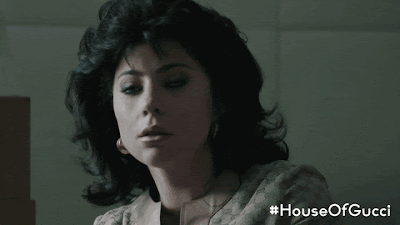or
"Father, Son, and House of Gucci" (The Sign of the Double-Cross)
The family Gucci are not happy with Ridley Scott's House of Gucci, and for once I have something in common with them. Scott's second film released this year is the lesser of the two—the other being The Last Duel—but both films deal with people obsessed with legacy and imagine themselves more important than they are and taking things to such an extreme that one can see the results and consider that hubris could be considered a cause of death.
"Inspired by a true story" (which means that there are more factual liberties taken than one "based on a true story" in some sort of cinematic legalese), it tells of Patrizia Reggiani (played bodaciously by Lady Gaga, who should, at least, get some sort of award for most extreme hip-swing), who rose from being a book-keeper at her step-father's trucking business to the wife of Maurizio Gucci (played—rather tentatively—by Adam Driver), prodding him from being a law student with no desire to be part of the family business to becoming the majority stock-holder of the company.Maurizio ended up running Gucci, despite his initial reticence, and then began living the "Gucci lifestyle" of spending money recklessly and running the business into the ground, as well as having affairs that would occupy his time and his budget. Finally, he asked Patrizia for a divorce, and she hired, through a psychic advisor of hers, to have Maurizio murdered in front of the Gucci building. She, the psychic and the hit-men were all convicted and sent to prison. End of story.
So, it must be embarrassing for the family that House of Gucci is less about them than it is about Patrizia, less about the glorious history of Gucci selling high-priced shoes and accessories to a easily-impressed world, than it is about a non-Gucci and the way that she so easily manipulated and up-ended the House of Gucci-branded cards. Well, live by public gullibility, die by public gullibility—the attention is directed from over-priced flotsam to scandal and once things like murder and tax evasion are put in court documents it becomes part of the public record and not so easily manipulated in-house. No wonder they're pissed.
Not that Scott and his writers have done such a miraculous work of art. Scott keeps things moving along with much less fluff in the air this time (perhaps indicating that this whole world is a bit unnatural?) and the luxurious furnishings and art knock-offs adorning the spaces are in fine crystal-clear display. It is cast with a buzz-inducing corral of actors in the secondary roles that created so much anticipation for this one that it couldn't possibly live up to expectations (live by the press release, die by the press release) and it simply does not.
They have their moments—Jeremy Irons as Maurizio's estranged father Rodolfo (living in his film-career past), Al Pacino as Uncle Aldo (in a sort of nightmare-version of what Godfather III could have been like) and Jared Leto as cousin Paolo (portrayed as something of a dim-wit, but in that weird Leto-land situated somewhere between comedy and tragedy). Irons, at least, plays things fairly straight, giving Rodolfo a diseased dignity even in his knowledge that his best days are past while he ruefully wallows in them—the best scene of the film is his "meeting" with Leto's Aldo trying to gain acceptance for his fashion sense where he charitably considers all his ideas and politely savages them. But, Pacino's avuncular Aldo has the same DNA as Eli Wallach's Don Altobello in GIII—smiling, but with a knife up his sleeve, a slow trickster, not altogether good at what he does. He has two explosive moments—both in involving Leto—but for the most part the three big supporting actors are in another movie where they're starring.
But, it's La Gaga's movie. Pratizia Reggiani is the only character in the piece who is seriously ambitious (without being deluded), while everyone else is either lethargically complacent or spineless. Like Gaga herself, the part calls for someone with ambitious goals and a ruthless way of achieving them and she tears into the role with a fierceness that is almost animalistic.It would be ironic if Scott found his project becoming known as being "that Lady Gaga movie" and having it wrested from his hands in the same way the Gucci's saw their work being taken from them. "Inspired by a True Story," indeed.








No comments:
Post a Comment